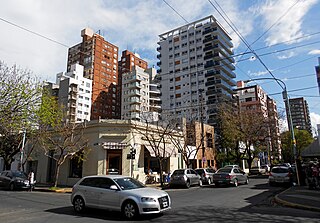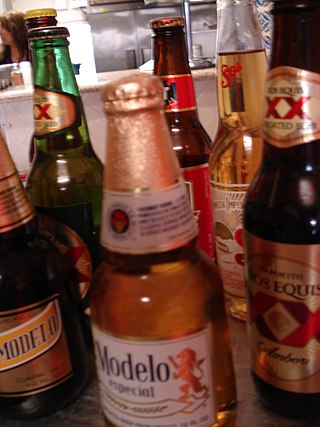
Shepherd Neame is an English independent brewery which has been based in the market town of Faversham, Kent, for over 300 years. While 1698 is the brewery's official established date, town records show that commercial brewing has occurred on the site since 1573. Since the brewery’s formation back in the 16th century, ownership has passed in unbroken succession through five families. The brewery produces a range of cask ales and filtered beers. Production is around 180,000 brewers' barrels a year. It has 303 pubs and hotels in South East England, predominantly in Kent and London. The company exports to 44 countries including India, Sweden, Italy, Brazil and Canada.
Heineken N.V. is a Dutch multinational brewing company, founded in 1864 by Gerard Adriaan Heineken in Amsterdam. As of 2019, Heineken owns over 165 breweries in more than 70 countries. It produces 348 international, regional, local and speciality beers and ciders and employs approximately 85,000 people.
The Molson Brewery is a Canadian-based brewery based in Montreal and was established in 1786 by the Molson family. In 2005, Molson merged with the Adolph Coors Company to become Molson Coors.

Quilmes is a city on the coast of the Rio de la Plata, in the province of Buenos Aires, Argentina, on the southeast end of the Greater Buenos Aires, being some 17 km (11 mi) away from the urban centre area of Buenos Aires. The city was founded in 1666 and it is the seat of the eponymous county.

Bass Brewery was founded in 1777 by William Bass in Burton-upon-Trent, Staffordshire, England. The main brand was Bass Pale Ale, once the highest-selling beer in the UK. By 1877, Bass had become the largest brewery in the world, with an annual output of one million barrels. Its pale ale was exported throughout the British Empire, and the company's iconic red triangle became the UK's first registered trade mark.

Cervecería Cuauhtémoc Moctezuma (Cervecería Cuauhtémoc Moctezuma / Heineken México) is a major brewery based in Monterrey, Nuevo León, Mexico, founded in 1890. It is a subsidiary of Heineken International.

History of beer in Mexico dates from the Spanish conquest of the Aztec Empire. While Mesoamerican cultures knew of fermented alcoholic beverages, including a corn beer, long before the 16th century, European style beer brewed with barley was introduced with the Spanish invasion soon after Hernán Cortés's arrival. Production of this beer here was limited during the colonial period due to the lack of materials and severe restrictions and taxes placed on the product by Spanish authorities. After the Mexican War of Independence, these restrictions disappeared, and the industry was permitted to develop. Furthermore, the arrival of German immigrants during the ephemeral Second Mexican Empire of elected Maximilian I of Mexico, born an Austrian archduke, in the 19th century provided the impetus for the opening of many breweries in various parts of the country.

Cervecería y Maltería Quilmes is an Argentine drink company founded in 1890 in the city of Quilmes in Greater Buenos Aires. The company was established by Otto Bemberg, a German immigrant, in 1890 as a beer manufacturer. Since 2002, Quilmes is owned by AmBev, the largest beer manufacturer in the world.

Herman Emanuel Bemberg Ocampo was a German-Argentine composer.
Les Sociétés Anonymes des Brasseries du Cameroun is a brewing company in Cameroon. Their offices and main factory are in Douala, with other breweries in Bafoussam, Douala, Garoua, and Yaoundé. Les Brasseries et Glacieres Internationales (BGI) owns a 75% share in the company, and Heineken owns 8.8%.

María Luisa Bemberg was an Argentine film writer, director and actress. She was one of the first Argentine female directors with a powerful presence both in the filmmaking and the intellectual world of Latin America, particularly during her most active period, from 1970 to 1990.
Carlos J. Miguens Bemberg, is an Argentine businessman and descendant of the wealthy Bemberg family of immigrants to Argentina.

German Argentines are Argentines of German ancestry as well as German citizens living in Argentina. They are descendants of Germans who immigrated to Argentina from Germany and elsewhere in Europe. Some German Argentines originally settled in Brazil, then later immigrated to Argentina. Although Germany as a political entity was founded in 1871, the German language and culture have traditionally been more important than the country of origin, as the basis of the ethnic and national consciousness of Germans. Today, German Argentines make up the fourth-largest ethnic group in Argentina, with over two million citizens of Volga German descent alone.

The beers of the Caribbean are unique to each island in the region, although many are variants of the same style. Each island generally brews its own unique pale lager, the occasional stout, and often a non-alcoholic malta beverage. Contract-brewing of international beers is also common, with Heineken Pilsener and Guinness Foreign Extra Stout being the most popular. The beers vary between the islands to suit the taste and the brewing method used.

The primary beer brewed and consumed in Chile is pale lager, though the country also has a tradition of brewing corn beer, known as chicha. Chile's beer history has a strong German influence – some of the bigger beer producers are from the country's southern lake district, a region populated by a great number of German immigrants during the 19th century. Chile also produces English ale-style craft beers while also developing its own craft beer identity.
Bemberg is a surname. Notable people with the surname include:

Paceña is a Bolivian beer produced in La Paz, hence its name that means the one of La Paz. The beer is produced by CBN a company that dates back to 1877 and that controls 80% percent of the Bolivian beer market. Paceña is made at about 3600 meters above sea level with purified water from the Andes.

Costa Rica has a very strong beer industry centered on mass-produced Lagers. Imperial beer, produced by Florida Ice & Farm Co. is known and associated with Costa Rica all around the world.
The annual consumption of beer in Argentina is about 33 litres per person.














